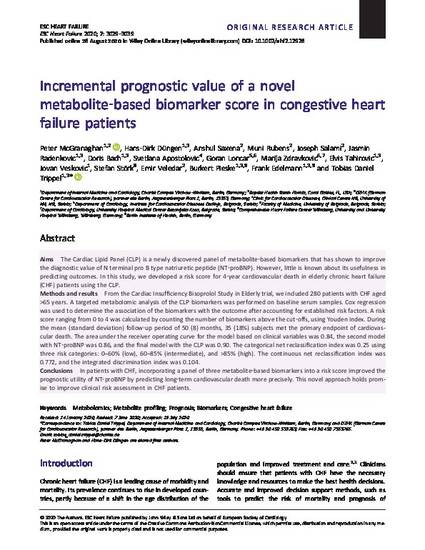
Aims: The Cardiac Lipid Panel (CLP) is a newly discovered panel of metabolite-based biomarkers that has shown to improve the diagnostic value of N terminal pro B type natriuretic peptide (NT-proBNP). However, little is known about its usefulness in predicting outcomes. In this study, we developed a risk score for 4-year cardiovascular death in elderly chronic heart failure (CHF) patients using the CLP. Methods and results: From the Cardiac Insufficiency Bisoprolol Study in Elderly trial, we included 280 patients with CHF aged >65 years. A targeted metabolomic analysis of the CLP biomarkers was performed on baseline serum samples. Cox regression was used to determine the association of the biomarkers with the outcome after accounting for established risk factors. A risk score ranging from 0 to 4 was calculated by counting the number of biomarkers above the cut-offs, using Youden index. During the mean (standard deviation) follow-up period of 50 (8) months, 35 (18%) subjects met the primary endpoint of cardiovascular death. The area under the receiver operating curve for the model based on clinical variables was 0.84, the second model with NT-proBNP was 0.86, and the final model with the CLP was 0.90. The categorical net reclassification index was 0.25 using three risk categories: 0–60% (low), 60–85% (intermediate), and >85% (high). The continuous net reclassification index was 0.772, and the integrated discrimination index was 0.104. Conclusions: In patients with CHF, incorporating a panel of three metabolite-based biomarkers into a risk score improved the prognostic utility of NT-proBNP by predicting long-term cardiovascular death more precisely. This novel approach holds promise to improve clinical risk assessment in CHF patients.
Available at: http://works.bepress.com/emir-veledar/403/
